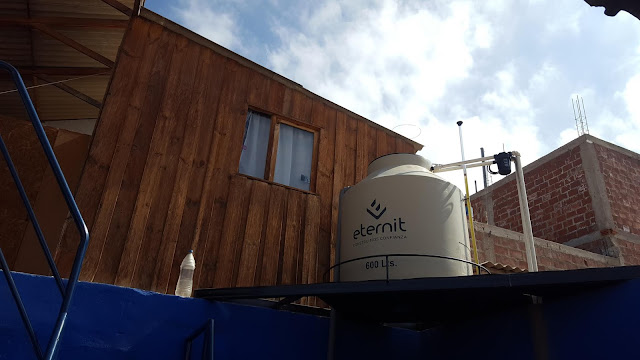When Water Comes to Habitat
 Tacna: a city on the edge of the desert.
Tacna: a city on the edge of the desert.Habitat: a neighborhood on the frontier of the city.
TacBloc: the Jesuit Volunteer house with its fair share of water problems.
In November of 2017, I first wrote about the struggle of water. Here we are, a year and a half later and big changes have come to our little house: the water tanks have arrived.
During my first year as a JV, I remember speaking out during our community meetings, voicing my frustration at the water cuts we were experiencing. Most days in the warmer months, you could expect water to disappear by noon or even earlier. A day without running water might turn into two or three, and we'd find ourselves down to our last bucket of water, crossing our fingers that a trickle would arrive in the wee hours of the morning the next day.
More concerning to me was the quality of water coming out of our sink. Sure, we would boil the water in order to kill any bacteria that might have wandered its way into our pots, but the sediment that would slowly drift to the bottom of our water bucket was rather unsettling. Dirt? Rust?, it was some mysterious substance that we felt should not have been entering our bodies. The problem with a water filter was that it required water pressure, something that our house and surrounding neighborhood often lacked. On top of that there were many days, sometimes a series of days on end, in which nothing would drip from the sinks at all.
I asked a few times more about our water situation, months went by, and I acclimated to life in our house. Up at dawn to fill buckets of water to wash clothes in, washing the dishes of the previous night before the tap ran dry, showering with a mug and a balde in the afternoons after my run. As I wrote in my original post, water became an integral part of our life, a dependency that I had not before experienced. I viewed it as an annoyance and an added stressor into this new vida I was living, an additional part of daily life that left me more tired than I would have liked.
January came, a new cohort of volunteers arrived, and off the volunteers went to spend their month in Mes de Misión in the rural regions of Tacna. There was some talk with the Jesuits about the possibility of installing a water tank but nothing was confirmed so we let it lay to rest.
When we returned at the end of January, it was to a house of full construction, and not just one but two water tanks. In a neighborhood in which most of our vecinos have barrels in the back patio to combat scarcity of water, the arrival of two tanks to our house felt like a glaring call for attention. We had the power and money of not only the Jesuits of Tacna but of our organization in the US to make us comfortable and secure. What luxury!
I felt an immediate sense of discomfort with these two shiny monsters in our back patio. All those months of dreaming of a more comfortable living situation; now I had it and it felt wrong. I realized that in my frustration over water, I had discovered a way to further understand the lives of the many mothers on my street who woke early to juntar water to get their chores done for the day. I lamented how future JVs would never experience the rush of panic as the tap dripped dry, never have to gather water in baldes so that they could bucket-flush the toilet (trust me, it's an art). I was grieving an era of living simply that had so quickly disappeared. A slow trickle of water was no longer be a gift from the heavens or a stroke of luck, but an annoying disturbance to a now much-easier daily routine. What a luxury it was to be able to wash one's dishes late at night, take a shower after a long run, be able to wash one's face in the sink! Future JV's would not understand the blessings of these simple actions, now so easily completed with the turn of a wrist.
Our neighbors have laughed at me more than once when I express embarrassment about our over-the-top tanks. For them, it's a blessing to be enjoyed, not something to feel bad about. They remind me that they would enjoy such tanks if they had the opportunity to install them in their houses.
The initial buyer's remorse has worn off. It's clear to me now that JV life changes as the generations come and go. Just because we have water tanks, does not mean that we have stopped being intentional JVs (in fact, some of our most intense and intentional discussions were about said tanks). But I do want to honor an era of simplicity in the house that once was. It now comes to my generation and the future JVs to come to navigate and define a new type of simplicity in our household.
In the meantime, I'm going to disfrutar my afternoon shower and enjoy water straight from the filter. If there's one thing Peruvians taught me, it has been to be grateful for the blessings in my life and enjoy them to the fullest.
 |
| Our well-worn, well-loved baldes |



Comments
Post a Comment